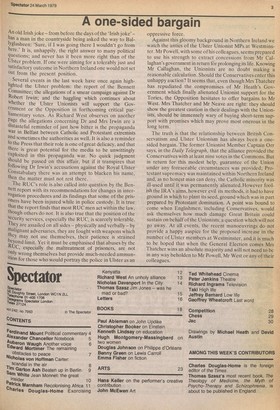A one-sided bargain
An old Irish joke — from before the days of the 'Irish joke' — has a man in the countryside being asked the way to BallYglasheen: 'Sure, if I was going there I wouldn't go from here.' It is, unhappily, the right answer to many political questions; and never has it been more right than of the Ulster problem. If one were aiming for a tolerably just and satisfactory outcome in Northern Ireland one would not set out from the present position.
Several events in the last week have once again highlighted the Ulster problem: the report of the Bennett Committee; the allegations of a smear campaign against Dr Robert Irwin; and the haggling which continues about Whether the Ulster Unionists will support the Government or the Opposition in forthcoming critical parliamentary votes. As Richard West observes on another Page the allegations concerning Dr and Mrs Irwin are a distasteful reminder of just how bitter is the propaganda war in Belfast between Catholic and Protestant extremists and sometimes the authorities as well. It is also a reminder to the Press that their role is one of great delicacy, and that there is great potential for the media to be unwittingly exploited in this propaganda war. No quick judgment should be passed on this affair, but if it transpires that following Dr Irwin's accusations against the Royal Ulster Constabulary there was an attempt to blacken his name, then the matter must not rest there.
The RUC's role is also called into question by the Bennett report with its recommendations for changes in interrogation procedures and its findings that some of the prisoners have been injured while in police custody. It is true that the report finds that most RUC men act within the law, though others do not. It is also true that the position of the security services, especially the RUC, is scarcely tolerable. They are assailed on all sides — physically and verbally — by malignant adversaries, they are fought with weapons which they may not use themselves, their patience is strained beyond limit. Yet it must be emphasised that abuses by the RUC, especially the maltreatment of prisoners, are not 9n. ly wrong themselves but provide much-needed ammunition for those who would portray the police in Ulster as an
oppressive force.
Against this gloomy background in Northern Ireland we watch the antics of the Ulster Unionist MPs at Westminster. Mr Powell, with some of his colleagues, seems prepared to use his strength to extract concessions from Mr Callaghan's government in return fOr prolonging its life. Knowing Mr Callaghan, the Unionists are no doubt making a reasonable calculation. Should the Conservatives enter this unhappy auction? It seems that, even though Mrs Thatcher has repudiated the compromises of Mr Heath's Government which finally alienated Unionist support for the Tories, the Opposition hesitates to offer bargains to Mr West. Mrs Thatcher and Mr Neave are right: they should show the greatest caution in their dealings with the Unionists, should be immensely wary of buying short-term support with promises which may prove most onerous in the long term.
The truth is that the relationship between British Conservatism and Ulster Unionism has always been a onesided bargain. The former Unionist Member Captain On says, in the Daily Telegraph, that the alliance provided the Conservatives with at least nine votes in the Commons. But in return for this modest help, guarantee of the Union under any foreseeable circumstances was provided; Protestant supremacy was maintained within Northern Ireland and, as no honest man can deny, the Catholic minority was ill-used until it was permanently alienated. However foolish the IRA's aims, however evil its methods, it had to have ground in which to plant its seed, ground which was in part prepared by Protestant domination. A point was bound to come when Englishmen, including Conservatives, would ask themselves how much damage Great Britain could sustain on behalf of the Unionists, a question which will not go away. At all events, the recent manoeuvrings do not provide a happy auspice for the proposed increase in the number of Ulster members at Westminster, and it is much to be hoped that when the General Election comes Mrs Thatcher wins an absolute majority and will not need to be in any way beholden to Mr Powell, Mr West or any of their colleagues.


































 Previous page
Previous page